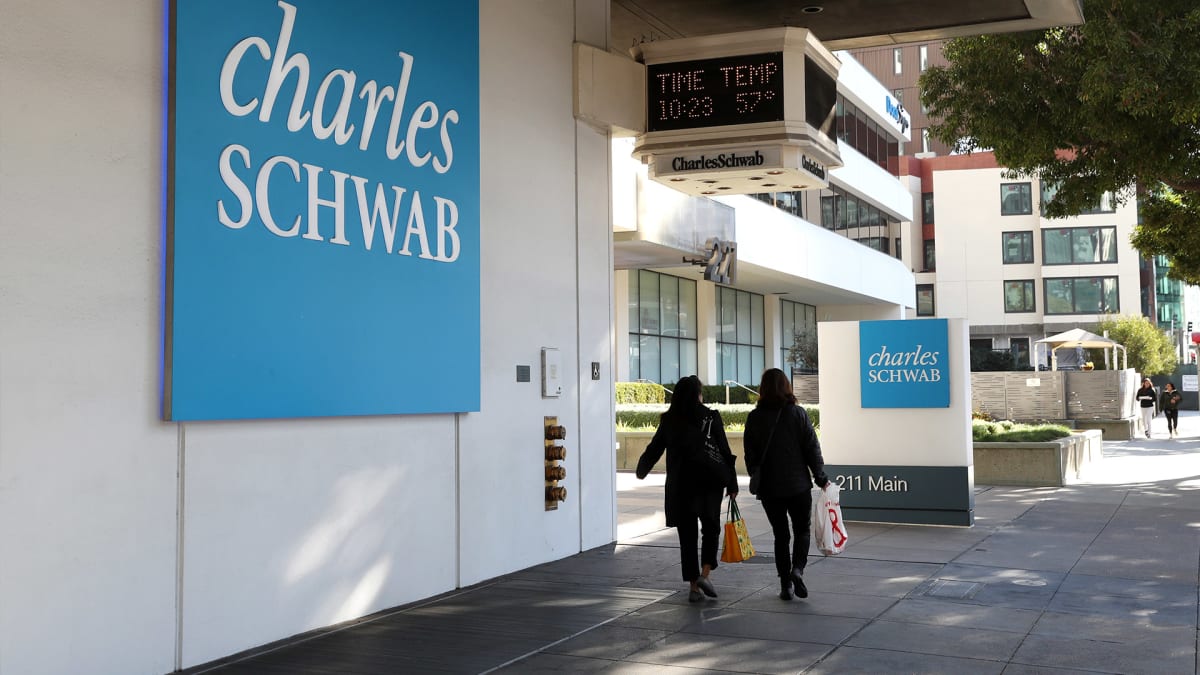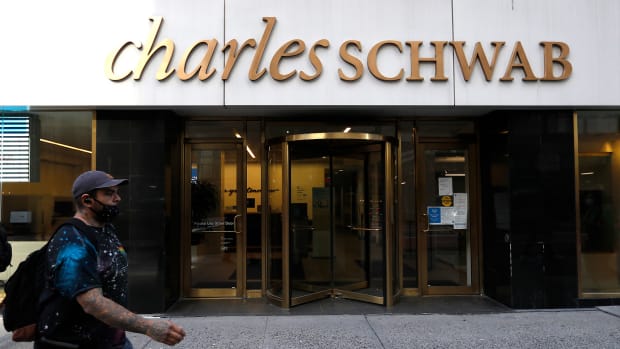
A disastrous month of March is what Charles Schwab has just experienced.
In the Westlake, Texas-based financial company, the month that just ended can be considered a real disaster.
An avalanche of bad news fell on the firm. The stock fell 33% between Feb. 28 and March 31. At the end of February, Charles Schwab's shares were trading at around $77.92. A month later, the price fell to $52.38.
The difference translates to more than $47 billion in market capitalization wiped out in just one month.
According to Bloomberg News, this is Charles Schwab's worst month since the October 1987 stock market crash, known as Black Monday. That day, the Dow Jones index lost 508 points, a decline of 22.6% and the largest daily decline in a stock market index at the time. Only the drop by 76% of the Icelandic stock market in 2008 would exceed this record.

John Lamparski/SOPA Images/LightRocket via Getty
What Happened?
Charles Schwab's banking arm is caught in the storm caused by the sudden collapse of the Silicon Valley Bank. Santa Clara, Calif.-based SVB was the go-to lender for many tech companies. It provided specialized financial services, industry expertise, a valuable network, and a strong reputation. It also offered a range of financial services, tailored specifically to the needs of startups, such as venture debt, corporate banking and asset management. These services are designed to help startups manage their finances, optimize their cash flow and scale their businesses.
Created in 1983, Silicon Valley Bank (SIVB), which presented itself as a "partner for the innovation economy,” offered higher interest rates on deposits than its larger rivals, to attract customers. The company then invested the clients' money in long-dated Treasury bonds and mortgage bonds with strong returns.
This strategy had worked well in recent years. The bank’s deposits doubled to $102 billion at the end of 2020 from $49 billion in 2018. In 2022, deposits increased to $189.2 billion.
But everything turned upside down when the Federal Reserve began to raise interest rates, which made existing bonds held by SVB less valuable. As a result, the bank had to sell the bonds at a discount to cover withdrawals from its customers. In selling these bond positions, SVB had to take a significant loss of $1.8 billion.
Due to this loss, SVB suddenly announced that it needed to raise additional capital of $2.25 billion, by issuing new common and convertible preferred shares. This decision caused panic and a run on the bank.
Since then, fears of the ripple effect have spread like wildfire, threatening the banking sector, despite the fact that too-big-to-fail banks have been subject to strict regulations since the financial crisis of 2008.
Like SVB and other banks, Charles Schwab bet on interest rates by buying bonds with long maturities. Therefore, the company logically has unrealized losses on these assets since they are less attractive to investors compared to new bonds whose remuneration is adapted to the current interest rates.
Some experts estimate that Schwab (SCHW) has $22 billion of unrealized losses.
The other problem is that the rise in interest rates is pushing some of its clients to look for assets offering better returns. The final headache remains the crisis of confidence affecting the banking sector as a whole.
These challenges raised a wave of pessimism among analysts, causing some of them to downgrade the company. This is the case with Michael Cyprys, at Morgan Stanley, who for the first time cut his stock rating because clients are moving cash to higher yielding options and there is no visibility on when they might stop.
The Company Remains Confident
Cyprys said the firm's customers are moving cash out of sweep accounts into money market funds at a $20 billion per month rate, which is twice what he had expected.
"This means SCHW earns less from monetizing cash, which will hurt earnings on top of higher funding costs," the analyst wrote in a note to clients. "While clients aren't leaving and SCHW has other sources of liquidity, earnings face more pressure than we had expected."
Schwab did not immediately respond to a request for comment.
But it said in a statement on March 17 that it has seen "strong inflows from clients over the last week. Over the past five trading days (March 10-March 16), clients have continued to bring assets to Schwab, with approximately $16.5 billion in core net new assets for the week, demonstrating the trust clients place in Schwab."
It added that the firm "remains a safe port in a storm, driven by its conservative balance sheet, strong liquidity position, and diversified base of over 34 million account holders who invest with Charles Schwab every day."
"We are confident in our approach and in our ability to help clients through all kinds of economic environments," the firm said.
CEO Walt Bettinger had displayed the same confidence during an interview with CNBC a few days earlier.
"What I’ve heard from the advisors that I spoke with yesterday is great confidence in our firm. ... They know how conservative we are. They know we don’t take risks,” Bettinger said. "That’s why we don’t go out a long way in terms of duration, and that’s why we maintain access to liquidity in the way that we do.”







